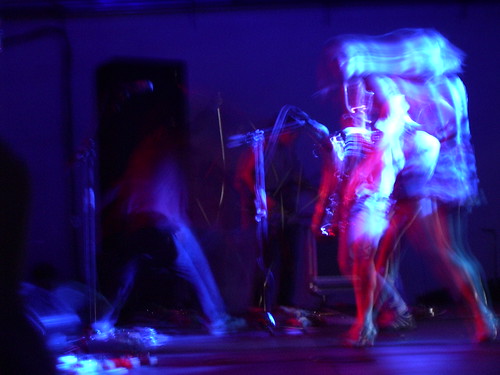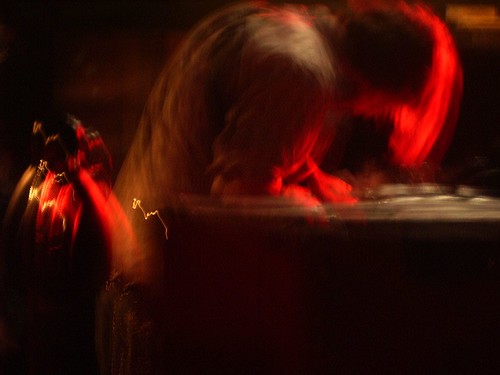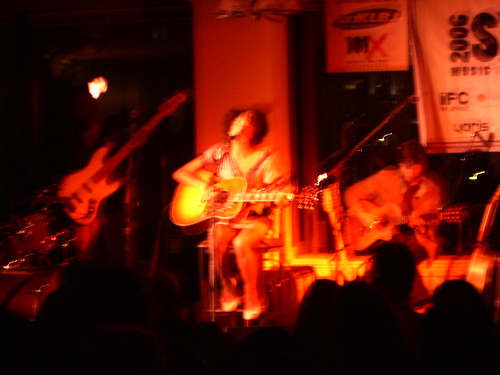[Cover Feature,
Loose Lips Sink Ships #6]
This is how I remember rock shows being: baking hot, cramped, earachingly loud and uncomfortably sweaty. The stage is only visible through bobbing heads and past a mist of steam, and sweat, and dry ice coloured by harsh beams of amber, scarlet and mauve light, so all we can see is a raging, fiery colour, the heat suffocating, intense.
Onstage, the rock’n’roll band play hard and clumsy and loose, and very, very loud. The venue is the Garage in London’s Highbury, where I spent many happily self-destructive evenings back when I went to a show a night (doubtless explaining this eerie sense of nostalgia), where those vibrating walls of black mesh either side of the stage are, in fact, part of a colossal PA system designed with the sole intention of rattling flesh from bone. I love this place. I love this band.
Cutting through this atmospheric reverie, Gareth Liddiard, a tall, sinewy man with a striking nose and liquid-acid eyes ringed by exhaustion that make him look the spit of a young Pete Townshend, pounds and shakes a chord that sounds like wrought, rusted iron from his guitar, and howls one more time into the microphone, stomping his boot hard onto the gaffer-taped stage in time with drummer Mike Noga’s primordial beat, so hard his body shakes a few sluicing beads of sweat from his forehead and slickered mop of hair, like every blow of stick upon drumskin were impacting on his spine, knocking him from an even keel, so he tumbles around like a marionette with a slit string, helpless, tortured, exultant, released. The mesh walls roar and shake with the resultant noise, crashing cymbals shattering into silver mist, bass heavy like a submarine scraping the ocean floor, twin guitars shrieking and squalling in reflexive pain, like parallel shards of lightning, or two fluctuating waves on a seismograph, electric with drama and meaning. And that voice, shredded, swerving and screeching like a drunk driver about the melody, accusatory, righteous, angry, spiteful and bitter, but really really fucking alive, and desperate, like it hasn’t anything to lose, like it already lost everything.
Urgency, romance, tension and feedback crackle through the air, as the group tear through the set, rough in execution but pure in spirit, loosely lashing at the songs to give space for those aching, blood-splattered guitars to breathe and roar, pulling together in glorious, unified crescendos of arcing, screeing wail. And they so look like a rock’n’roll group, Mike feral and caged behind racked drums, bassist Fiona Kitschin coolly scanning the audience from the side of stage, lending piercing backing vocals that twist into seductive harmony with Gareth’s, guitarist Rui Pereira raucous and violent with his instrument, a wild genius, and Gareth, trapped in a one-way screaming match with his microphone, poised with such a powerful authority (which comes natural, I guess, to someone who’s spewing a lifetime of his own bile up for our entertainment, knowing that some of us at least will dig this, and wanna thank him for it).
The song is ‘Baby Squared’, a brash, brawling garage-rock poesie to maddening love, spiked and sparked up like if Neil Young and his Crazy Horse ever dug the music of the Sex Pistols as much as Johnny Rotten’s pop-cultural significance and shared-outsider status, the amps so loud they’re glowing, the guitar tones serrated to their very centres, bolts of frazzled and angular fury bouncing out a nagging, neo-classic melody. You’ll find it on Wait Long By The River And The Bodies Of All Your Enemies Will Float By, the second album from Melbourne’s The Drones, a rock’n’roll band characterised, as their album title suggests, by a heady mixture of black humour and bitter recrimination.
“It’s a rawer emotional element,” muses Gareth Liddiard earlier, over an afternoon pint, of The Drones’ exquisitely anguished blues (which are, incidentally, teeming and crazed with life in its most brutal forms, in case the moniker ‘The Drones’ suggested altogether more egghead pleasures). “It’s all about booze, isolation, cheap amps and cheap guitars. And there’s an emotional element to it as well, a lot of grief filters through. It depends on your mood, but it can be cathartic, to get that shit out there. If I’m having a good time, if I’m happy, I never feel compelled to write a song, and that song would probably be pretty fuckin’ boring anyway.”
Gareth struggles a little to describes what the Drones do. It’s just rock’n’roll, he offers, safe in the knowledge that we both understand that, in the right (calloused) hands, ‘just rock’n’roll’ can be a scorching, singular, special thing. But for the benefit of the uneducated masses out there, he elaborates. “It’s, uh, semi-traditional weird folk blues, and we bend shit, pervert it, tailor it to suit us.”
The Drones are a group steeped in rock’n’roll. Gareth talks affectionately of his youth in Perth, of tuning in to the local radio, and the great stations in Melbourne that pumped out a neverending mix of ugly/beautiful noise, so by the age of ten these wise radio waves had already grounded the young Gareth in the likes of The Stooges and Led Zeppelin, along with local legends like The Saints and The Scientists.
“I remember hearing ‘Immigrant Song’ on the radio, as a kid,” he remembers, “And I didn’t catch the name of the song, just that Led Zeppelin was the band. And I was desperate to hear that song again. So I started saving up my pocket money - I got ten bucks a week, and tapes were ten bucks, and there were nine Led Zeppelin albums. It took me nine weeks, and Led Zeppelin III was the last one I bought, because it was hard to track down, and there it was, first track, side one, this insane heavy-metal thrash song that sounded like it was from the future…”
Born in Australia, Gareth moved with his family to London shortly after he was born. They lived there for a few years before moving back to Perth, but Gareth remembers seeing Blondie on the television, as a kid, one of his early memories. “It’s a pretty atmospheric and intense song, it really hooked into me as a kid,” he grins. “The video was pretty hot too.
“I remember, back then, pop was really depressing and dark. There was great stuff, like Bronski Beat. Now, its all ‘you can’t have sad shit in pop because you’ll scare everyone off‘! But back then, everything was all echoey and dark, and that really rubbed off on me, I dug that. It spoke to me. And hearing shit like Prokofiev, Peter And The Wolf. There was more of a ‘Brothers Grimm’ bent to popular culture back then, it seemed.
“My family had all the Beatles records. I know people who deny the Beatles… The great converter is ‘Helter Skelter’, though. I’m always, like, Dude, listen to this. It’s so intense… It’s fucked up. I wouldn’t fuck with Paul McCartney, he’d fuckin’ take your head off. Boy has got some thumbs…”
High school was an education in itself, in music and, uh, related chemistries. “Stooges, Hendrix, Zep, The Byrds occasionally,” he lists. “Marijuana, acid, that sort of shit. Lots of Sabbath, smoking pot to Pink Floyd - which is the best thing anyone could ever do. Listening to Syd Barrett on acid was our education. My old man had Smash Hits, that Hendrix compilation. I listened to it on my walkman travelling to school one day, and it begins with ‘Stone Free’, and the first minute or so is kinda dull and sounds shitty. I thought it was terrible. Then it stops, and the wah-wah kicks in, and I went on this insane psychedelic journey, like I saw people falling out of the bus… I just thought, oh my god… One of the greatest moments of my life. My brain just went pfffffblrrrt!
“And after that, Townes Van Zandt, Bob Dylan, Nina Simone, Karen Dalton, Charlie Parker… Everything really. If its good, its good. If its shit, its shit. I listen to the good stuff.”
Gareth is, as you might sense, a pretty opinionated music fan, though with a broader embrace than The Drones’ monolithic rock might suggest. “ I never liked posers, although a bit of pretence is cool - like The Smiths, there’s a bit of showbiz going on there. No bullshit, and a bit of imagination, rather than the same old shit. People trying to make their own thing - AC/DC and the Stones are the only people allowed to rip off Chuck Berry, anyone else, forget it. It’s been done to death. Being in Melbourne, we know Jet, and the keyboard player on our record is Jet’s keyboard player. It’s a semi-small town. I don’t hate anyone for doing that shit, but it can be a bit naff,” he sneers. He shivers a bit. “You’d bore yourself stupid, wouldn‘t you?
“My family weren’t great communicators,” he remembers. “Obviously, I needed something that gave me what I needed, what I was lacking. And that was music. I remember hearing Bob Dylan as a kid, just thinking, fuuuuuck. Music’s one of the best ways to communicate; as an art form, its probably the most popular, the most universal. Even some idiot selling fish and chips could understand music… He probably likes Tom Jones [laughs].”
The Drones began in Perth. Gareth brought his girlfriend, Fee, on board, to play bass and sing backing vocals. And Gareth’s old buddy, Rui, played guitar and violin and sang. “I’ve known Rui since High School, we’ve always been fucking around with music,” grins Gareth.
Gareth, Rui and Fee loaded their gear in a van and drove across country, to Melbourne. There, they hooked up with drummer Mike Noga, and plugged into Melbourne’s vital, history-soaked music scene. “There’s a history of really cool shit there,” he enthuses. “The Saints, Radio Birdman, The Scientists, Nick Cave… Groups from Melbourne play without compromise, we have this kind of autonomy because we’re so isolated, so far from the rest of the world. There are major labels in Australia, but they’re only interested in the most banal pop shit, if you’re doing anything remotely interesting or worthwhile they’ll never be interested in you. Which is good, because that means there’s no incentive to sweetening your sound, no razzing it up to impress a Major.
“Talk to the old crew from Melbourne, people like Kim Salmon or Nick Cave, they’re all getting on for fifty or whatever, and then there’s us upstarts coming up beneath them. And they’re all saying, ‘we hate tradition’, but, for better or for worse, they all started something, and once you’ve heard it, you can’t get away from it. And we were brought up on it.”
Wait Long By The River is The Drones’ second album, preceded by 2002’s Here Come The Lies. They’re a productive band, with two more finished albums in the can; “Productive, when we’re allowed,” he adds, grouchily. “For the last two years we’ve had this fucking legal shit with our old record company, we had to bail on them, paid a huge amount of money to do it.”
Their music is at once familiar and unique. The rock’n’roll they grew up on is a key influence, and Crazy Horse references abound. The Drones’ masterful slow songs glide like spectres doomed to eternally haunt the brooding opening chords of Neil Young’s ‘Cortez The Killer’, sombre, sincere, unbearably melancholic. Their faster songs adopt a more ‘punk’ lick, tribal stomp drums, charring plane-wreck guitars blasting away, but still that coruscating guitar tone remains. And, over all, the heavy karmic weight of ‘Cowgirl In The Sand’, the betrayed rancour and recrimination of ‘Down By The River’ dominate.
“Some things are so basic and so ingrained,” he explains. “If you get a Les Paul, put a bit of distortion on it through a Fender amp, and play basic chords with your fingers, with a straight drum beat behind you, you’ll sound like Crazy Horse. Shit like Dirty Three, its so basic that it’s genius. You can’t get away with it, the moment you run a violin through a Marshall you’ll sound like the Dirty Three. Like, the minute you start fucking around with your tunings, you sound like Sonic Youth. You can’t help it, man! It’s base stuff. And Neil Young, once you’ve heard him, how could you not sound a little like him?”
They definitely plug into a tradition of ragged and glorious Australian punk bands, murderous rabbles like The Beasts Of Bourbon, The Birthday Party, The Scientists, The Saints, and Dirty Three. “These people are friends, we know people like Rowland S. Howard, and Spencer Jones of the Beasts. We hang out, and we’ve borrowed gear off them. Growing up watching these dudes murder guitars must’ve rubbed off somehow. The Beasts were an awesome band, so rough and ugly. It’s mean, it’s what rock’n’roll’s meant to be, what it threatens to be that… Their shows were like Black Flag shows, ambulances would be waiting when you got there. It was pretty rough stuff. Not that violence is cool, but it’s kinda fun.
“Our fans are cool, it gets pretty rough down the front. We’ve been touring with Deerhoof,” he continues, brow furrowing, “playing to the ‘indie’ crowd… Deerhoof are an amazing band, and I love what they do, but they play is pretty much devoid of anger or aggression - it’s ‘indie’ stuff. Whereas, we come from a place that’s nasty, mean-spirited - which can be fun. Everyone’s thought “You fucking cunt!” when someone fucks them over, but not everybody comes out and says it. It’s like the Sex Pistols, they were mean-spirited, but it was fun.”
Regret, frustration, and depression are prime fodder for The Drones’ art. The guilt-etched dirge, ‘The Freedom Of The Loot’, is a fantastically bleak song of crime and injustice, of good people made to be bad, and how lives down mean a shit in the face of cold cash. Later that night, Gareth’s face is twisted with rage as he sings the hopeless, scorning refrains, his voice splintering, bruised. He sounds like he’s gargling a mixture of his own blood and grievances, like Joe Strummer with an ounce of vim in his nostrils, like in ‘The Right Profile’ when he perfectly apes a speed’n’booze-blocked, stammering Montgomery Clift, only it’s disgust that’s tearing Gareth’s words to a messy mulch in his mouth.
It is perhaps unsurprising to discover that booze figures largely in The Drones’ lives, given their occupation. “Alcohol and music go together, traditionally,” he laughs. “Take flamenco music… All those dudes playing it are pissed, you know? They get drunk, they play music, they dance. The greatest elements of any culture are booze, music and art. But then there’s the downside of booze…”
It’s this side that The Drones’ music most evokes: the sour outlook of a hangover, the regret caused by drunken indiscretions, painful emotions amplified by booze.
“I’m 29 now,” reasons Gareth, “My twenties were a series of horrible disasters, so I was probably an alcoholic, for better or for worse. I need to figure that one out. You just get depressed, because you’re drunk. If you’ve been drinking for three days, you don’t have to have been drinking hard, but you’ll feel like shit, and you’ll fix it with more booze. If you have three or four days off the booze, you feel so fucking good, happy, and then you go straight down the pub and have a great night and you’re back on it. It’s a vicious circle. Australia has a massive drink culture And don’t forget drugs. You’ll be fucked if you overdo it. But they’re fun too.
“I got stoned when we played Amsterdam, and thought, fuck, I should do this more often. I’d been getting really uptight, like, getting tunnel vision, I couldn’t really see things clearly. And after smoking pot, I had a totally different perspective. I thought, fuck, I should do this at least once a month, to keep my ideas fresh. But with booze, its an emotional drug, it can fuck you up with grief and frustration… It’s a double-edged sword. But booze and an electric guitar are beautiful things, turn it way up loud and BLAAAAH.”
The slow-burning blues of ‘Sitting On The Edge Of The Bed Crying’ is a standout, a folksy minor-chord guitar figure cracking a whip over Gareth’s glum lament. “Every now and again I think its borderline mawkish,” he confesses, of the song. “I don’t like mawkish songs, so there are times when I think, is this a terrible song? But it’s not mawkish, it’s inconsolable. Everyone’s been inconsolable in their lives… Look at Leonard Cohen, some of the best music ever written was by Leonard Cohen. It comes from a dark place, but it’s still funny. Melancholy’s beautiful, there’s a sweetness there. It’s all about perspective, and different experiences give you different perspectives… It’s wisdom, you know… That’s what I call it. Bad things happen…”
Sincerity seems important to you.
“You’ve got to be sincere,” he nods, sharply. “You can tell when someone’s ‘faking it’, or not. I remember the first time I heard Black Flag, Keith Morris was the singer, and I thought it was perfect… He was being himself, admitting he’s a wounded idiot, and just having a sense of humour about it. It was sad and funny, I thought it was beautiful, and very sincere.”
‘Locust’, an eerie and stripped-raw, drunken mourn, eked out on piano, atmospheric guitars and percussion, is an exercise in under-rehearsal (a method which explains the album’s one-take ferocity) a la Crazy Horse, the group played and played, the song building to an unexpected freakout of avant-guitar, electric violin and malevolent drone, before dying away. “There was supposed to be a chorus,” laughs Gareth. “But we went into this big, epic freakout, and we totally forgot to play it! It’s hilarious. The tape just fades out on the album; moments after the fadeout, Mike yells out, ‘We sound like a bunch of pissed fuckin’ idiots!’ But it sounded amazing… What Tom Waits called the ‘hair in the gate’ effect. ‘Mistakes’ are what make art. Who would want to perfect rock’n’roll? That sounds so fuckin’ boring.
“Some people treat rock’n’roll like it’s something to be afraid of,” he continues. “Like the guy who runs Triple M, the big commercial station in Australia, he says the trick to running a radio station is to find a song that doesn’t offend or upset anyone, but that doesn’t quite bore them to death, and just play it a thousand times a day, and you sit back and rake in the ad revenues.
“It’s fucked. People like art, they aren’t afraid of it. But that’s the way things are now; people look at forests and think, ‘Hmm, I could make a lot of money here, gotta chop all these trees down!’ Everything is commerce now, and its fuckin’ horrible. Everything has to justify its existence through making money, why can’t it just exist? Why can’t culture just be culture? That’s one of the beauties of travelling through Europe, culture’s not there to make people money, it’s there because it’s an important thing. It’s part of the soul, and we all have souls, you can’t deny that.
“Something has died,” he adds, warming to his theme. “You had your industrial revolution, and the machine became so well-oiled, we forgot why we built it in the first place. It’s become such a machine, it’s hard to get through the bullshit. I mean, Jesus, pop culture used to be cool, it used to be Alex Chilton and Andy Warhol; now, it’s not that at all. It’s Simon Cowell, it’s terrible. It’s sad. Shit gets so bad, but it just helps you to see the good stuff more clearly. You got to spend a little time looking for it, is all, but that’s part of the fun of it.”
Onstage, later that night, the guitar heroics abound; instruments are battered and held aloft, in some weird cycle of worship and abuse, and hammered into mic-stands, and hoisted towards the crowd. Shapes are thrown, and at one point, Gareth’s contortions send his amp toppling, causing a dramatic pause, a drone-streaked intake of breath before, with preternatural timing, they tear back into the song. I’m loving every histrionic, over-the-top minute of it, this kamikaze ballet of self-destructive rock’n’roll heroics.
Watching Gareth hurtle about the stage, screaming way past the comfort zone, I think of Guy Picciotto’s quote, circa his time with Rites Of Spring, that hurting yourself on a guitar was a more worthwhile gesture than just sitting in your room crying to yourself. It’s heroic, and self-destructive, and it doesn’t quite make much sense, and, well, that’s pretty much the definition of old skool, dumb ‘heroism’ Hollywood fed me for all those years. And if these grisly songs deal mostly with how can fuck you over, plunging their fists into the maw of the depressions that hold the artists down, at least they do so in some glorious, exhilarating fashion, even if that heroism is ultimately doomed, even if they pull off their onstage whirlwind at the expense of their equipment, their health and their sanity. It’s like the war movie where the hero saves his platoon and takes out the enemies, only he kills himself in the process; The Drones play out their inner dramas as blood-splattered death-matches, and its this drama, this stage play, this sense of high adventure and moral intrigue that makes this music, these musicians, so heroic. And, cliched though it may seem, it’s the art that makes the unglamorous grind of being a touring rock band worthwhile.
“Rui was brought up damned poor,” laughs Gareth, finally, telling a story that perfectly illustrates the group’s collective ‘shit happens’ mindset, drawing beautiful art and raw humour from life’s dark stuff. “We wrote this thing for the biog on our website, ‘Rui pereira rides the other guitar like the admiral of a Portuguese man o’ war with a hangover. The master of disaster leaves guitars in plaster and it’s no secret that the Portuguese freak born in Mozambique during the war was brought up poor, which keeps him more than keen to make a scene’. His parents saw the biog and, being ex-poor people, were fuckin’ furious. Because poor people don’t like to be reminded about that kind of shit. We meant it as a joke, but they’d lived through a war, and grinding poverty, and they didn’t need that shit.”
Gareth shoots me a well-meaning look, and tries to explain why he made the joke in the first place. “I tried to explain to them, man, ‘It’s war and it’s poverty…’” he grins, eyes flashing wildly. “‘That shit’s hilarious, man!’”
(c) Stevie Chick 2005



